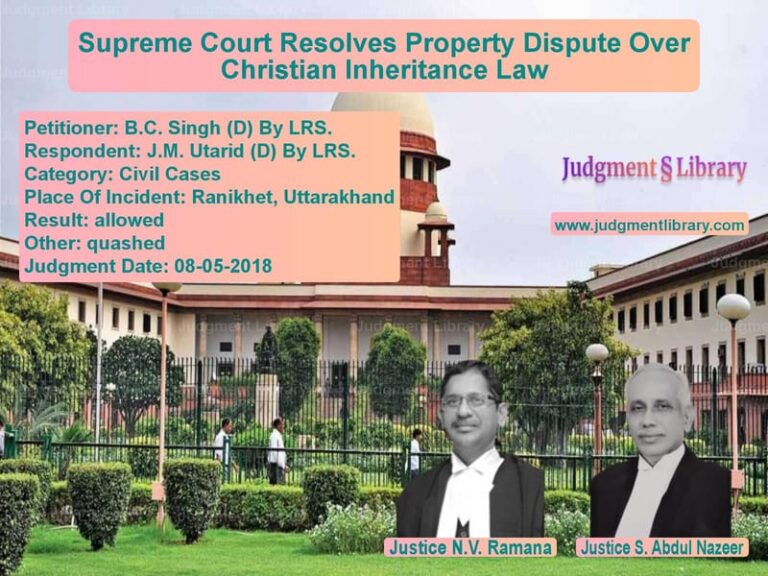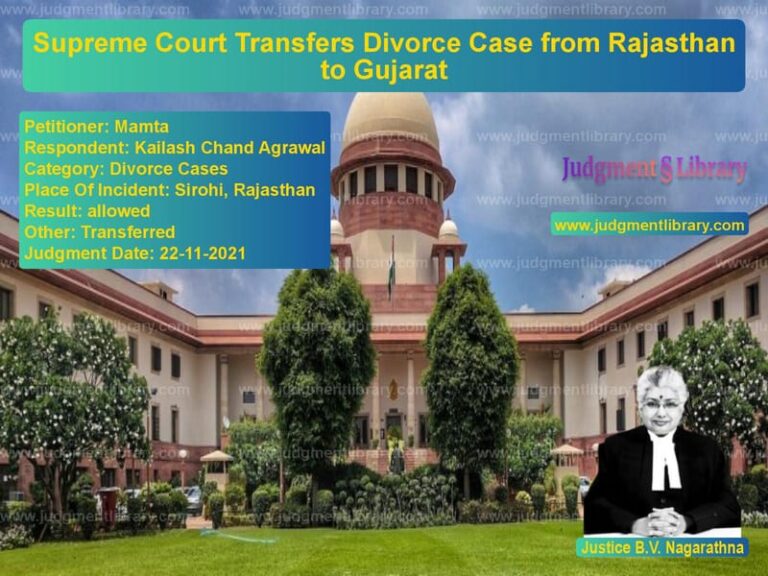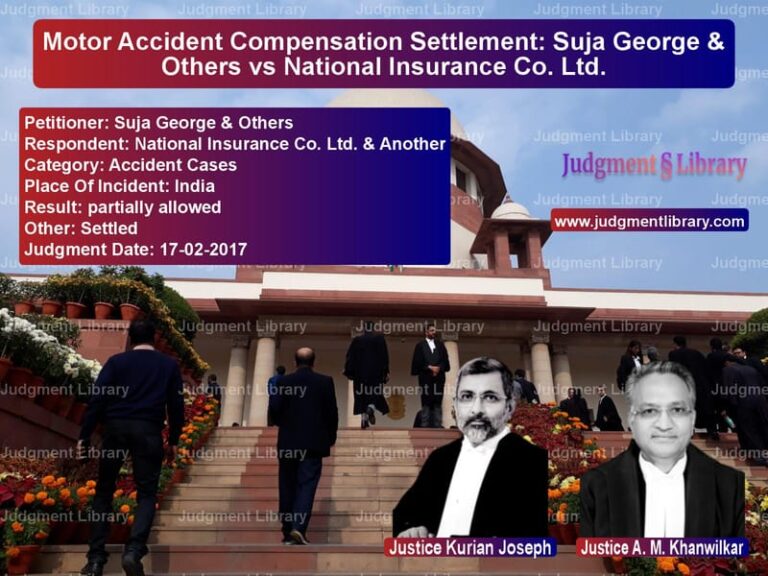Supreme Court Ruling on Trespass and Criminal Conspiracy: Clarifying Corporate Criminal Liability
The case of Ravindranatha Bajpe vs. Mangalore Special Economic Zone Ltd. & Others is a landmark ruling by the Supreme Court of India concerning criminal liability in corporate structures. The case raises significant questions about whether executives and directors of a company can be held liable for offenses such as trespass, property damage, and criminal conspiracy without direct involvement.
Background of the Case
The dispute arose when Ravindranatha Bajpe filed a criminal complaint against thirteen accused, alleging that a company, along with its contractors and executives, had illegally trespassed onto his property, destroyed his boundary wall, cut down valuable trees, and laid a water pipeline without lawful authority. The complaint sought legal action under various sections of the Indian Penal Code, including:
- Section 406 – Criminal breach of trust
- Section 418 – Cheating
- Section 420 – Cheating and dishonestly inducing delivery of property
- Section 427 – Mischief causing damage
- Section 447 – Criminal trespass
- Section 506 – Criminal intimidation
- Section 120B – Criminal conspiracy
Complainant’s Allegations
The complainant alleged that:
- He was the absolute owner of the property in question.
- The accused, which included companies, their directors, contractors, and laborers, conspired to lay a water pipeline through his land without permission.
- The accused demolished a 7-foot-high stone boundary wall and destroyed 100 valuable trees.
- The trespass occurred while the complainant was out of town, and upon his return, he discovered the destruction.
- When he confronted the accused, he was threatened with violence.
The complainant initially filed a police complaint, but when no action was taken, he filed a private complaint before the Judicial Magistrate, First Class, in Mangalore.
Legal Proceedings and Lower Court Rulings
Magistrate’s Summoning Order
After examining the complainant on oath and reviewing the evidence, the Judicial Magistrate issued summons to all thirteen accused for the alleged offenses.
Sessions Court’s Decision
The accused challenged the Magistrate’s order in the Sessions Court, which ruled in their favor by:
- Quashing the summons against accused Nos. 1 to 8 (primarily company executives and directors).
- Allowing proceedings to continue against accused Nos. 9 to 13 (primarily contractors and laborers involved in the actual work).
High Court’s Ruling
The complainant then appealed to the Karnataka High Court, which upheld the Sessions Court’s ruling. The High Court reasoned that merely being an executive or director of a company does not automatically establish criminal liability.
Supreme Court’s Analysis and Judgment
Key Questions Considered
The Supreme Court examined:
- Whether executives and directors of a company could be held criminally liable for the actions of subordinates or contractors.
- Whether the Magistrate had applied the correct legal standard while issuing summons.
- Whether vicarious liability applies to corporate executives in cases of criminal trespass and property damage.
Supreme Court’s Findings
Absence of Specific Allegations
The Supreme Court noted that the complainant had made broad accusations against senior executives without specific allegations of direct involvement.
“Except the bald statement that accused Nos. 2 to 5 and 7 & 8 conspired with a common intention to lay the pipeline, there are no other allegations that at that time they were present.”
The Court ruled that criminal liability cannot be imposed solely based on a person’s corporate designation without evidence of active participation.
Principle of Vicarious Liability
The Court reaffirmed the principle that:
“A corporate entity is an artificial person which acts through its officers. However, criminal liability cannot be imputed automatically in the absence of a statutory provision.”
Executives and board members cannot be held liable for crimes committed by employees or contractors unless there is evidence of their direct involvement.
Summoning Order Must Be Well-Reasoned
The Court emphasized that Magistrates must carefully scrutinize the evidence before issuing summons:
“Summoning of an accused in a criminal case is a serious matter. The order of the Magistrate summoning the accused must reflect that he has applied his mind to the facts of the case and the law applicable thereto.”
The Court found that the Magistrate had failed to demonstrate this application of mind.
Final Judgment
The Supreme Court ruled:
- The summons issued to accused Nos. 1 to 8 was quashed.
- The case would proceed against accused Nos. 9 to 13.
- Corporate officers cannot be held vicariously liable in the absence of specific allegations of direct involvement.
Implications of the Judgment
This judgment has far-reaching implications for corporate criminal liability:
- Protecting Corporate Executives: Prevents unnecessary criminal prosecution of executives who have no direct role in alleged offenses.
- Higher Standards for Summoning Orders: Ensures that courts must apply rigorous scrutiny before initiating criminal proceedings.
- Limits on Vicarious Liability: Reinforces that liability in criminal law must be based on individual actions, not just hierarchical position.
Conclusion
The Supreme Court’s decision in Ravindranatha Bajpe vs. Mangalore Special Economic Zone Ltd. & Others sets a critical precedent in corporate criminal liability. It affirms that criminal law cannot be misused to harass corporate executives without clear evidence of wrongdoing. The ruling strengthens protections against arbitrary legal actions while ensuring that criminal proceedings remain fair and based on sound legal principles.
Petitioner Name: Ravindranatha Bajpe.Respondent Name: Mangalore Special Economic Zone Ltd. & Others.Judgment By: Justice M.R. Shah, Justice A.S. Bopanna.Place Of Incident: Mangalore.Judgment Date: 27-09-2021.
Don’t miss out on the full details! Download the complete judgment in PDF format below and gain valuable insights instantly!
Download Judgment: ravindranatha-bajpe-vs-mangalore-special-ec-supreme-court-of-india-judgment-dated-27-09-2021.pdf
Directly Download Judgment: Directly download this Judgment
See all petitions in Fraud and Forgery
See all petitions in Property Disputes
See all petitions in Attempt to Murder Cases
See all petitions in Theft and Robbery Cases
See all petitions in Judgment by Mukeshkumar Rasikbhai Shah
See all petitions in Judgment by A. S. Bopanna
See all petitions in dismissed
See all petitions in Quashed
See all petitions in supreme court of India judgments September 2021
See all petitions in 2021 judgments
See all posts in Criminal Cases Category
See all allowed petitions in Criminal Cases Category
See all Dismissed petitions in Criminal Cases Category
See all partially allowed petitions in Criminal Cases Category







